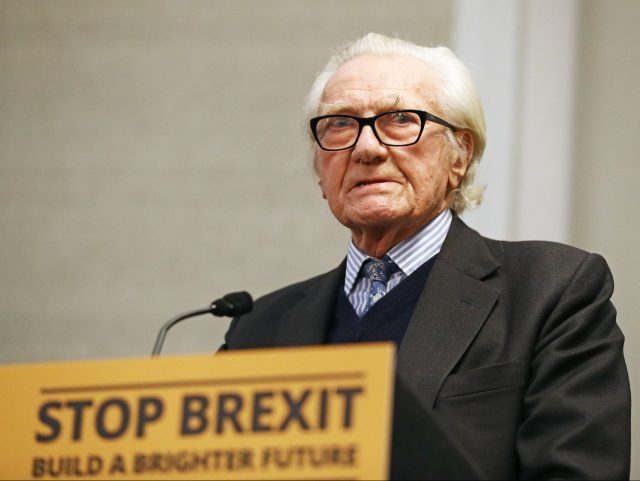Arch-Remainer Michael Heseltine, best known for bringing down Margaret Thatcher, is gloating that “if Boris goes, Brexit goes” now the Prime Minister’s departure has been confirmed.
The 89-year-old media darling, who was appointed Deputy Prime Minister by John Major in the 1990s as reward for aiding a coup against Margaret Thatcher for her turn towards euroscepticism, said that the “critical thing here is that Boris is associated with one major policy, and that is Brexit,” adding: “I coined the phrase: ‘If Boris goes, Brexit goes.’”
In comments to Sky News quoted by The Telegraph, the elderly anti-Brexiteer appeared irritated that Johnson’s downfall coincided so nearly with Labour leader Sir Keir Starmer claiming his party would not seek to reverse Brexit if returned to office.
“Keir Starmer has been wrong-footed in making these anti-European speeches, as he has on the basis that he was going to fight Boris Johnson [in the next general election],” Heseltine suggested.
“Now, of course, the Tory party is going to have to find a new leader. My belief is that there will be a return to sanity towards our policies about Europe which will make Keir Starmer look, I think, rather foolish,” he added.
By “a return to sanity towards out policies about Europe” — meaning the European Union — Heseltine presumably means that Johnson’s successor as Prime Minister will not seek to challenge the bloc’s continued sway over Northern Ireland or significantly diverge from its way of doing things.
Indeed, he may hope a future leader may seek to, if not reverse Brexit, steer Britain even closer into a Brexit-In-Name-Only, or BRINO, relationship with Brussels — possibly via a scheme like French president Emmanuel Macron’s proposal to create a “European political community” expanding beyond the EU proper to encompass the likes of Ukraine.
Some European Union bigwigs certainly seem to see Johnson’s looming departure as an opportunity to at least partially undo Brexit.
Michel Barnier, the bloc’s chief negotiator during the Brexit talks, hailed the coup against the Prime Minister as the turning of “a new page in relations” with Britain, for example.
“May it be more constructive, more respectful of commitments made, in particular regarding peace [and] stability in [Northern Ireland], and more friendly with partners in [the European Union],” he went on, insisting that there was “so much more to be done together.”
Former Belgian prime minister Guy Verhofstadt, who represented the European Parliament in the Brexit talks, was even more tactlessly triumphant, declaring that Johnson’s “reign” had ended “in disgrace, just like his friend Donald Trump.”
“The end of an era of transatlantic populism? Let’s hope so,” he jeered, claiming that relations between the European Union and United Kingdom “suffered hugely with Johnson’s choice of Brexit” and chirping “Things can only get better!”
The current frontrunner to succeed Johnson as Tory leader and Prime Minister is Defence Secretary Ben Wallace, who campaigned for Remain during the EU referendum in 2016.
Many others tipped as contenders for the leadership are also Remainers, including Foreign Secretary Liz Truss, former foreign secretary Jeremy Hunt, former health secretary Sajid Javid, and former Northern Ireland secretary Brandon Lewis.
Wallace owes much of his popularity, despite having been something of an unknown until recently, due to a boost in visibility resulting from Russia’s invasion of Ukraine and a fairly serious and uncontroversial demeanour.
His anti-Brexit past and belief that it is “ridiculous” to expect full control over national borders may come to erode party supporters’ fondness for him if it becomes more widely known, however.

COMMENTS
Please let us know if you're having issues with commenting.